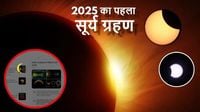On March 29, 2025, a remarkable solar eclipse is taking place, marking the first such event of the year. The eclipse began at 2:20 PM and will end at 6:16 PM, lasting a total of 3 hours and 56 minutes. However, this celestial phenomenon will not be visible in India, which has led to the conclusion that the associated Sutak Kaal, a period of purification before an eclipse, will not be applicable.
This solar eclipse is classified as a partial eclipse, meaning that only a portion of the sun will be obscured by the moon. Such events are significant not just for astronomers but also for enthusiasts around the globe, eager to witness this astronomical occurrence. Although it won’t be visible in India, the excitement surrounding the event is palpable among scientific communities and astronomy lovers.
The eclipse is set to be observed in various parts of Europe, Asia, Africa, North America, South America, and certain regions of the Atlantic and Arctic Oceans. According to reports, this eclipse is particularly noteworthy as it coincides with Shani Amavasya, a significant day in the Hindu calendar that occurs when the moon is in conjunction with the sun.
Astrological beliefs hold that eclipses can have various effects on the twelve zodiac signs. Traditionally, it is advised to perform certain rituals during eclipses to mitigate any negative impacts. However, since this particular solar eclipse will not be visible in India, many of these rituals, including the Sutak Kaal, which usually begins 12 hours before the eclipse, will not be observed.
For those who are curious about what to do during an eclipse, there are customary practices that many still follow. It is generally advised against looking directly at the sun during an eclipse, as it can cause serious eye damage. Additionally, preparing food or consuming meals is discouraged due to the belief that negative energies may contaminate these items during the eclipse.
Instead, individuals are encouraged to engage in spiritual activities such as chanting mantras or reading sacred texts. It is also customary to place basil leaves in food items to protect them from being tainted by the eclipse's energy. After the eclipse concludes, it is recommended to take a bath and perform acts of charity to cleanse oneself spiritually.
Despite the lack of visibility in India, the event is still significant from a scientific standpoint. Eclipses provide valuable opportunities for research and observation, helping scientists gather data about solar and lunar phenomena.
As the world watches the eclipse unfold in various locations, the anticipation and excitement surrounding this astronomical event highlight the enduring fascination humanity has with celestial occurrences. Whether viewed through telescopes or simply enjoyed in the company of friends and family, solar eclipses continue to capture the imagination.
In summary, while the solar eclipse on March 29, 2025, may not cast its shadow over India, it remains a captivating event for the global community. As scientists and enthusiasts prepare to observe this celestial wonder, it serves as a reminder of the intricate dance between the earth, moon, and sun, and the mysteries still to be uncovered in our universe.







